- Home
- Al Sarrantonio
Five World Saga 01 Hornets and Others
Five World Saga 01 Hornets and Others Read online
Hornets & Others
By Al Sarrantonio
Digital Edition published by Crossroad Press
© 2011 / Al Sarrantonio
Copy-edited by: Christine Steendam, Erin Baily, and David Niall Wilson
Cover Design By: David Dodd
Background Images provided by:
http://jerry8448.deviantart.com
LICENSE NOTES
This eBook is licensed for your personal enjoyment only. This eBook may not be re-sold or given away to other people. If you would like to share this book with another person, please purchase an additional copy for each person you share it with. If you're reading this book and did not purchase it, or it was not purchased for your use only, then you should return to the vendor of your choice and purchase your own copy. Thank you for respecting the hard work of this author.
OTHER CROSSROAD PRESS BOOKS BY AL SARRANTONIO:
Novels:
Campbell Wood
Haydn of Mars – Book I of the Masters of Mars Trilogy
House Haunted
Kitt Peak
Moonbane
October
Queen of Mars – Book III of the Masters of Mars Trilogy
Sebastian of Mars – Book II of the Masters of Mars Trilogy
Skeletons
Summer Cool
Tales From the Crossroad, Vol 1
The Boy With Penny Eyes
The Masters of Mars – The Complete Trilogy
The Worms
Totentanz
West Texas
Collections:
Toybox
Halloween & Other Seasons
Unabridged Audiobooks:
Moonbane – Narrated by Kevin Readdean
Buy Direct From Crossroad Press & Save
Try any title from CROSSROAD PRESS – use the Coupon Code FIRSTBOOK for a one-time 20% savings! We have a wide variety of eBook and Audiobook titles available.
Find us at: http://store.crossroadpress.com
To My Brother,
Tom
CONTENTS
Preface
The Ropy Thing
The Only
The Beat
In the Corn
Two
The Coat
The Haunting of Y-12
Billy the Fetus
Stars
Bags
The Red Wind
The Green Face
White Lightning
The Glass Man
Violets
The Quiet Ones
Hornets
PREFACE
Some of these stories are old and dear friends of mine; others, after visiting them for the first time in ten or twenty years since their publication, seem like new ones. I was particularly pleased to reread one tale and be totally surprised by the ending: is that craftsmanship allied to a bad memory, which I have ever owned, or merely incipient senility? Two stories are brand new to both of us.
In any event, dear reader, I do hope you find something herein to enjoy, and, more importantly, something that scares you...
Al Sarrantonio – May, 2003
The Ropy Thing
The ropy thing got most of the neighborhood while Suzie and Jerry were watching Saturday morning cartoons on TV. Then the cable went out and Jerry's dad put on the radio but then that went out too. By then Suzie and Jerry were watching the ropy thing from the big picture window in Jerry's living room. The ropy thing was very fast, and sometimes they saw only its tip stretched high and straight, or formed into a loop, or snaking over a house or between trees or moving over cars. It hesitated, then shot into the moving van in front of Suzie's house across the street, pulling a fat uniformed mover out, coiling around him head to toe like a mummy and then yanking him down into the ground. It pulled Suzie's mom into the ground too, catching her as she tried to run back into the house from where she had been directing the movers from the curb.
"We're getting out!" Jerry's dad shouted, giving Jerry a strange look, and the ropy thing got him in the front yard between the garage and the car. Behind him was Jerry's mom, with an armful of pillows, and the ropy thing got her too. It got Jerry's sister, Jane, as she was sneaking away from the house to be with her boyfriend, Brad, down the block. Suzie and Jerry watched the ropy thing jump out of the bushes in front of Brad's house like a coiled black spring, getting Jane right in front of Brad, just as she reached to hold his hand. Brad turned to run but it got him too, shooting up out of the lawn and over the sidewalk, thin and fast. It whipped around Brad and squeezed him into two pieces, top and bottom, then pulled both halves down.
Suzie and Jerry ran up to the attic, and the ropy thing snaked up around the house but didn't climb that high and then went away. From the small octagonal attic window they watched it wrap around the Myers' house and pull the Myers' baby from the second-story window. Then it curled like a cat around the Myers' house's foundation, circling three times around and twitching, and stayed there.
"This is just like—" Jerry said, turning to Suzie, fear in his voice. "I know," Suzie said, hushing him.
When they looked back at the Myers' house all the windows were broken and the porch posts had been ripped away, and the ropy thing was gone. They spied it down the block to the right, waving lazily in the air before whipping down; then they saw it up the block to the left, moving between two houses into the street to catch a running boy who looked like Billy Carson.
The day rose, a summer morning with nothing but heat.
The afternoon was hotter, an oven in the attic.
The ropy thing continued its work.
They discovered that the ropy thing could climb as high as it wanted when they retrieved Jerry's dad's binoculars and found the ropy thing wrapped like a boa constrictor around the steeple of the Methodist church in the middle of town, blocks away. It pulled something small, kicking and too far away to hear, out of the belfry and then slid down and away.
"I'm telling you it's—" Jerry said again.
Peering through the binoculars, Suzie again hushed him, but not before he finished: "—just like my father's trick."
They spent that night in the attic with the window cracked open for air. The ropy thing was outside, moving under the light of the moon. Twice it came close, once breaking the big picture window on the ground floor, then shooting up just in front of the attic window, tickling the opening with its tip, making Jerry, who was watching, gasp, but then flying away.
They found a box of crackers and ate them. The ropy thing's passings in front of the moon made vague, dark-gray shadows on the attic's ceiling and walls.
"Do you think it's happening everywhere?" Jerry asked.
"What do you think?" Suzie replied, and then Jerry remembered Dad's battery shortwave radio that pulled in stations from all over the world. It was in the back of the attic near the box of flashlights.
He got it and turned it on, and up and down the dial there was nothing but hissing.
"Everywhere..." Jerry whispered.
"Looks that way," Suzie answered.
"It can't be..." Jerry said.
Suzie ate another cracker.
Suddenly, Jerry dropped the radio and began to cry. "But it was just a trick my father played on me! It wasn't real!"
"It seemed real at the time, didn't it?" Suzie asked.
Jerry continued to sob. "He was always playing tricks on me! After I swallowed a cherry pit he hid a bunch of leaves in his hand and made believe he pulled them from my ear—he told me the cherry pit had grown inside and that I was now filled with a cherry tree! Another time he swore that a spaceship was about to land in the backyard, then he made me watch out the big picture window while he
snuck into the back and threw a toy rocket over the roof so that it came down in front of me!" He looked earnest and confused. "He was always doing things like that!"
"You believed the tricks while they were happening, didn't you?" Suzie asked.
"Yes! But—"
"Maybe if you believe something hard enough, it happens for real."
Jerry was frantic. "But it was just a trick! You were with me, you saw what he did! He buried a piece of rope in the backyard, then brought us out and pulled the rope partway out of the ground and said it was part of a giant monster, the Ropy Thing, which filled up the entire Earth until it was just below the surface—and that anytime it wanted it would throw out its ropy tentacles and grab everybody, and pull them down and suck them into its pulsating jelly body—"
He looked at Suzie with a kind of pleading on his face. "It wasn't real!"
"You believed."
"It was just a trick!"
"But you believed it was real," Suzie said quietly. She was staring at the floor. "Maybe because my mother was moving, taking me away from you, you believed so hard that you made it real." She looked up at him. "Maybe that's why it hasn't gotten us—because you did it."
She went to him and held him, stroking his hair with her long, thin fingers.
"Maybe you did it because you love me," she said.
Jerry looked up at her, his eyes still wet with tears. "I do love you," he said.
They ate all the food in the house after a week, and then moved to the Myers' house and ate all their food, and then to the Janzens' next door to the Myers'. They ate their way, uninvited guests, down one block and up the next. They ran from house to house at twilight or dawn. The ropy thing never came near them, busy now with catching all the neighborhood's dogs and cats.
Even when they did see the ropy thing, it stayed away, poking into a house on the next block, straining up straight, nearly touching the clouds, black and almost oily in the sun, like an antenna. It disappeared for days at a time, and once they saw a second ropy thing, through the telescope in the house they were living in, so far away from their own now that they didn't even know their hosts' names. They were near the edge of town, and the next town over had its own ropy thing curling up into the afternoon, rising up like a shoot here and there, pausing for a moment before bending midriff to point at the ropy thing in their own neighborhood. Their own ropy thing bent and pointed back at it.
Suzie looked at Jerry, who wanted to cry.
"Everywhere," she said.
As the summer wore on the squirrels disappeared, and then the birds and crickets and gnats and mosquitoes. Jerry and Suzie moved from house to house, town to town, and sometimes when they were out they saw the ropy thing pulling dragonflies into the ground, swatting flies dead and yanking them away. Everywhere it was the same: the ropy thing had rid every town, every house, every place of people and animals and insects. Even the bees in the late summer were gone, as if the ropy thing had saved them for last, and now pulled them into its jelly body along with everything else alive. In one town they found a small zoo, and paused to look with wonder at the empty cages, the clean gorilla pit, the lapping water empty of seals.
There was plenty to eat, and water to drink, and soda in cans, and finally when they were done with the towns surrounding their town they rode a train, climbing into its engine and getting the diesel to fire and studying the controls and making it move. The engine made a sound like caught thunder. Even Jerry laughed then, putting his head out of the cab to feel the wind like a living thing on his face. Suzie fired the horn, which bellowed like a bullfrog. They passed a city, and then another, until the train ran out of fuel and left them in another town much like their own.
They moved on to another town after that, and then another after that, and always the ropy thing was there, following them, a sentinel in the distance, rising above the highest buildings, its end twitching.
Summer rolled toward autumn. Now, even when he looked at Suzie, Jerry never smiled anymore. His eyes became hollow, and his hands trembled, and he barely ate.
Autumn arrived, and still they moved on. In one nameless town, in one empty basement of an empty house, Jerry walked trembling to the workbench and took down from its pegboard a pair of pliers. He handed them to Suzie and said, "Make me stop believing."
"What do you mean?"
"Get the ropy thing out of my head."
Suzie laughed, went to the workbench herself and retrieved a flashlight, which she shined into Jerry's ears.
"Nothing in there but wax," she said.
"I don't want to believe anymore," Jerry said listlessly, sounding like a ghost.
"It's too late," Suzie said.
Jerry lay down on the floor and curled up into a ball.
"Then I want to die," he whispered.
Winter snapped at the heels of autumn. The air was apple cold, but there were no more apples. The ropy thing spent the fall yanking trees and bushes and late roses and grass into the ground.
It was scouring the planet clean of weeds and fish and amoebas and germs.
Jerry stopped eating, and Suzie had to help him walk.
Idly, Jerry wondered what the ropy thing would do after it had killed the Earth.
Suzie and Jerry stood between towns gazing at a field of dirt. In the distance the ropy thing waved and worked, making corn stalks disappear in neat rows. Behind Jerry and Suzie, angled off the highway into a dusty ditch, was the car that Suzie had driven, telephone books propping her up so that she could see over the wheel, until it ran out of gas. The sky was a thin dusty blue-gray, painted with sickly clouds, empty of birds.
A few pale snowflakes fell.
"I want it to end," Jerry whispered hoarsely.
He had not had so much as a drink of water in days. His clothes were rags, his eyes sunken with grief. When he looked at the sky now his eyeballs ached, as if blinded by light.
"I...want it to stop," he croaked.
He sat deliberately down in the dust, looking like an old man in a child's body. He looked up at Suzie, blinked weakly.
When he spoke, it was a soft question: "It wasn't me, it was you who did it."
Suzie said nothing, and then she said, "I believed. I believed because I had to. You were the only one who ever loved me. They were going to take me away from you."
There was more silence. In the distance, the ropy thing finished with the cornfield, stood at attention, waiting. Around its base a cloud of weak dust settled.
Quietly, Jerry said, "I don't love you anymore.”
For a moment, Suzie's eyes looked sad—but then they turned to something much harder than steel.
"Then there's nothing left," she said.
Jerry sighed, squinting at the sky with his weak eyes.
The ropy thing embraced him, almost tenderly.
And as it pulled him down into its pulsating jelly body, he saw a million ropy things, thin and black, reaching up like angry fingers to the Sun and other stars beyond.
The Only
When you meet Harbor Road, turn south. Now I can almost hear your footsteps. Walk until the breakers on your left seem about to wash up around you over the boardwalk, and the shop lights become dimmer, more secret. The shadows hug themselves here. Your footsteps are tentative now, but you are close—when you pass under a dull yellow streetlamp that hums, blinking out and then flaring on again, on the verge of an extinction never achieved, look up. There is a sign in a window, of three letters, and inside and upstairs, as they told you, you will find me. This is what you must do.
I can hear you coming.
Bill was drunk when they met him at the bus terminal. When Paul held out his hand, a lopsided smile of welcome on his face, Bill only grinned widely and put a half-empty pint of Jim Beam into his palm. "There's one or two more of those somewhere," he said, patting at his drab green coat. He grinned again, an elfin thing from this small man, smaller-looking under the army crew cut that was beginning to fill out on his head.
"Bastard," the third member of their party, silent till now, said. He looked as if he was brooding, but the other two knew he wasn't.
"Bastard yourself," Bill said, and then he hugged the other, holding him out then at the shoulders. "How are you, Jimmy?"
"Good enough." The thin, sour features turned wry. "Better than you, you drunk bastard."
"Hah! And more of that to come! I want to hit Harbor Road."
Paul began, "I thought we'd go back to my place for a while, have a couple of beers—"
"Beers, bullshit. I want to see the Bay, relive old times. Four friggin' years..."
He looked down at his shoes, shiny black, trying to remember something, feeling around his memory.
"Four friggin' years..."
"Come on," Paul said, taking him by the arm. "We'll do it your way. I know just where to start."
"Oh?" Bill said, and then he smiled and held out his hand to take the pint of Jim Beam from his friend.
It was late and grey. It had been warm in the afternoon, the thermometer crawling up from the damp thirties to hover, exactly at midafternoon, near fifty. But now the mercury was falling again, and the sky was falling with it. It had been a damp October and now a damp November, and the weak try at Indian summer the weather had given the past couple of days looked now to be losing out to the inevitable cold. It would be chilly tonight, and there was already, out over the edge of the Bay, a hint of mistiness that would turn to thick fog by morning.
They walked east, toward the water. A movie marquee said HALLOWEEN FRIGHT WEEK, but the K in week was already down and an attendant on a ladder was carefully removing the other letters one by one; the posters in the window now showed two lovers in a close-up 1940's-style embrace. They walked past a couple of bars, but even Bill didn't turn his head; this wasn't their section.

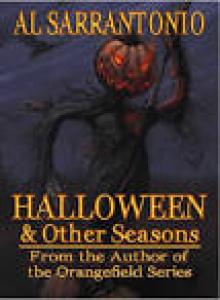 Five World Saga 01 Hornets and Others
Five World Saga 01 Hornets and Others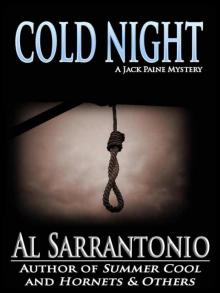 Cold Night (Jack Paine Mysteries)
Cold Night (Jack Paine Mysteries)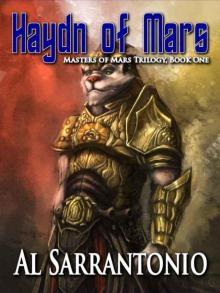 Haydn of Mars
Haydn of Mars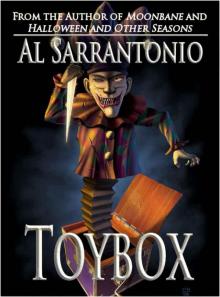 Toybox
Toybox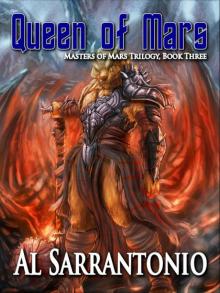 Queen of Mars - Book III in the Masters of Mars Trilogy
Queen of Mars - Book III in the Masters of Mars Trilogy Exile
Exile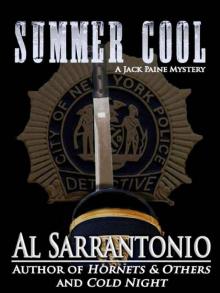 Summer Cool - A Jack Paine Mystery (Jack Paine Mysteries)
Summer Cool - A Jack Paine Mystery (Jack Paine Mysteries)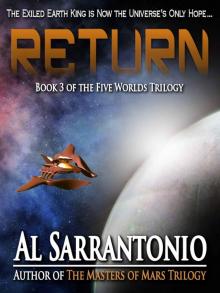 Return - Book III of the Five Worlds Trilogy
Return - Book III of the Five Worlds Trilogy The Orangefield Cycle Omnibus
The Orangefield Cycle Omnibus Summer Cool jp-2
Summer Cool jp-2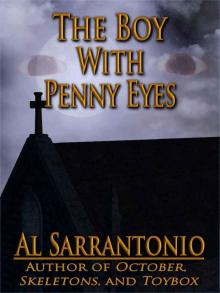 The Boy With Penny Eyes
The Boy With Penny Eyes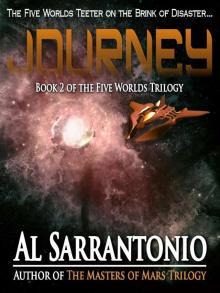 Journey - Book II of the Five Worlds Trilogy
Journey - Book II of the Five Worlds Trilogy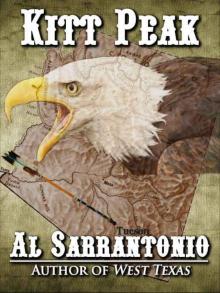 Kitt Peak
Kitt Peak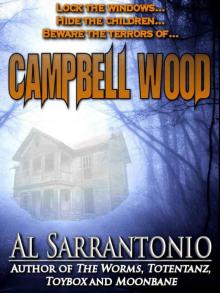 Campbell Wood
Campbell Wood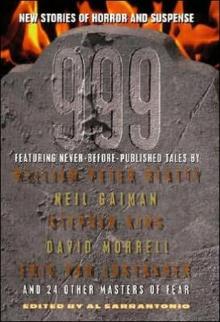 999
999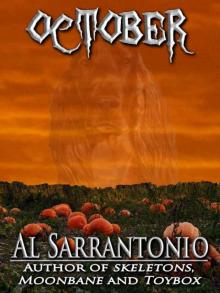 October
October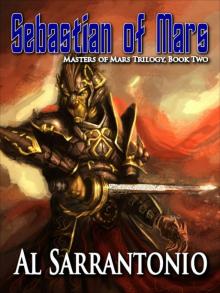 Sebastian of Mars
Sebastian of Mars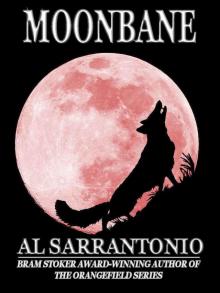 Moonbane
Moonbane Totentanz
Totentanz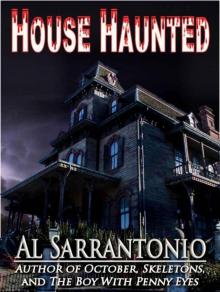 House Haunted
House Haunted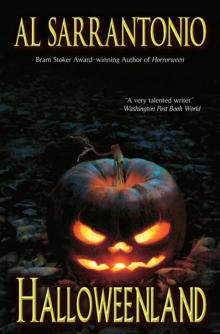 Halloweenland
Halloweenland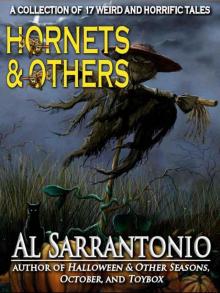 Hornets and Others
Hornets and Others